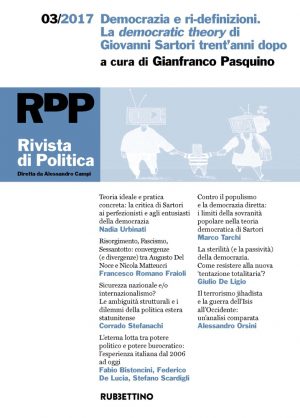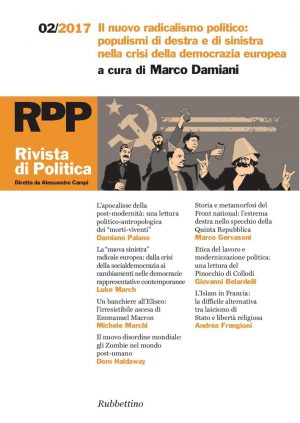01/2017 – “America First”: come cambiano gli Stati Uniti e il mondo con l’elezione di Donald J. Trump. A cura di Alia K. Nardini
ISSN: 2037-495X
8,50€ – 11,00€
Descrizione
Sommario:
congetture & confutazioni
La solita minestra. Piketty, Mazzucato e i “populismi” Alberto Mingardi
La vittoria di Trump e la rivincita postuma di Huntington Valter Coralluzzo
L’attualità del pensiero politico di David Hume Leonardo Varasano
La democrazia italiana è al capolinea? Maurizio Griffo
Ancora sul pauperismo di papa Francesco. Risposta a Luciano Canfora Emanuele Cutinelli Rèndina
Intelligence e complotti. L’eterna lotta per il potere nella società della disinformazione Mario Caligiuri
dossier: l’eredità di obama, l’america di trump
L’America di Barack Obama: bilanci e prospettive, Alia K. Nardini
Gli Stati Uniti e il mondo. Lo scenario internazionale: com’era, cosa cambierà, Italico Santoro
Il futuro del conservatorismo: riconciliare le anime del Partito Repubblicano, Antonio Donno
La religione nelle elezioni presidenziali 2016, Francesco Martini
Il voto ebraico: Israele e Stati Uniti in prospettiva, Amy Rosenthal
Il presidenzialismo mediatico e la campagna elettorale 2016, Luca Mencacci
La politica economica e monetaria di Trump. Discontinuità e possibili conseguenze per l’economia europea, Michele Bagella
archivio del realismo politico
La politica immaginaria Lorenzo Ornaghi
machiavelliana
Un dio tiranno. Strauss, Machiavelli e la critica della Bibbia, Marco Menon
osservatorio sull’europa
L’identità costituzionale e politica dell’Unione europea, Luca Galantini
«Il più grande ideale per cui valga la pena di lavorare». Croce, Einaudi, l’Europa e il Trattato di Parigi, Andrea Pinazzi
cinema e politica
Quando l’ideologia invade lo schermo. L’histoire du cinéma (1935-1943) di Maurice Bardèche e Robert Brasillach Claudio Siniscalchi
Abstracts
Alia K. Nardini, Obama’s America: An Evaluation
The election of Barack Obama on November 4, 2008, was welcomed with great enthusiasm among his supporters. The young Senator from Illinois promised to enact radical change through the introduction of a more egalitarian, humane, and inclusive approach. In line with his promises, the logic underlying Obama’s double presidency has been to pass bold policies domestically in the field of social justice (welfare, gender, race, education, energy), while adopting a more flexible, multilateral approach in the foreign policy realm. This paper therefore looks at the laws that were approved in and for America during the period 2008-2016, and at the changes that may take place in the coming years. Ultimately, this paper argues that Barack Obama will be remembered for his innovative actions in the domestic field, although most of the American public believes that he overreached – or that he could and should have done more.
Italico Santoro, The Global Scenario: How it was, how it will change
Donald Trump will take office as the new President of the United States in a very delicate historical phase. After Barack Obama’s transition from the use of hard power to soft power in international affairs, the U.S. has reduced military intervention across the globe in favor of diplomacy. Over the next years, America’s role will be more decisive than ever: will it contribute significantly to the definition of a more stable international order, or give a further boost to «global disorder»?
Antonio Donno, The Future of Conservatism: Reconciling the Souls of the Republican Party
This essay discusses the political relationship between the new American president, Donald Trump, and his party, the Republican Party. The question is whether the history of the Republican Party, as a conservative party, will be compatible with the ideas of Donald Trump, in domestic policy and in US international relations. Only the concrete political action of the new President in the coming months will provide a coherent response to this problem.
Francesco Martini, The Role of Religion in the 2016 U.S. Presidential Elections
Religion has an impact on American politics that is unique among Western democracies: the 2016 presidential election is no exception. The paper explores the denominational background of leading candidates, the role played by religion and religious people during the campaign, and electoral results by religious affiliation. While black Protestants, latino Catholics and Jews voted overwhelmingly Democrat, and white evangelicals aligned with Republicans, white Catholics played a big role in Donald Trump’s victory and were instrumental in delivering traditionally Democratic States like Pennsylvania, Michigan and Wisconsin to the Republican Party.
Amy K. Rosenthal, The Jewish Vote: Israel and the U.S. in Perspective
Jews in the U.S. and Israel are often grouped together as one and the same. However, recent data demonstrates that they vote in dramatically different ways and that the communal bond they once shared is now waning. This paper examines the two main factors that account for this division and how eight tumultuous years of the Obama administration have accentuated it.
Luca Mencacci, The 2016 Election Campaign and Media-friendly Presidentialism
The presidential election have just ended and, for the first time in the history of the United States, the President is a man who has never before held political office or military appointments. Aided by an unparalleled media-friendly charisma and by the paradox of a complacent electoral system, Donald Trump defeated Hillary Clinton who, in spite of an unprecedented political curriculum, failed in the undertaking of breaking the glass ceiling. This essay, however, claims to investigate the possibility that the recently concluded election campaign has not only displayed the political contest between the two candidates, but that it rather has shown the first example of a systemic antagonism, which affects the future quality of democratic representation, contrasting the candidate-oriented vote against the party-oriented one.
Michele Bagella, Discontinuities in U.S. Economic and Monetary Policies, as Announced by President Trump. Consequences for the European Economy
During his election campaign, Donald Trump announced his intention to pursue a deep change of the United States of America’s economic policy. Three points in his announcements command attention, because of the implications that they could have on the world economy: neo-protectionism, public spending, and the review of the Dodd-Frank Act (financial deregulation). Last but not least, the new “entente cordiale” US-Russia could be the prelude of a U-turn in US foreign policy. If so, the economic world order would be involved and modified, with uncertain results for the international equilibrium.
Lorenzo Ornaghi, Imaginary Politics
“Imaginary” politics is an increasingly prominent feature of this day and age. To an ever-greater degree, it is encouraging social representations of “what politics is”, thereby stifling the desire and ability to understand politics as it is. The aim of the article is not to address the discrepancy between traditional definitions of politics and imaginary politics, but rather to analyse the main features of the latter and consider their implications. Imaginary politics is interwoven with the fictions unremittingly generated by the “as if” (als ob) phenomenon over the course of human history. Nevertheless, imaginary politics is nowadays superimposing itself upon real politics, largely as a result of the pervasiveness and overabundance of politics that characterised the 20th century. The ubiquity of politics is now coinciding with its dilution. The very relationship between politics and power, whilst enduring and still close in international politics, is perceived as increasingly fleeting within the domestic politics of contemporary democracies. Democracy itself appears indeed dangerously in the grip of imaginary politics, which “imagines” current democratic politics to be an arena for competing personal interests and a machine for producing and protecting privileges above all else.
Marco Menon, A Tyrannical God. Leo Strauss and Machiavelli’s Critique of the Bible
This paper analyzes the Straussian reading of Machiavelli’s critique of Biblical religion. The first paragraph examines the major difficult which Machiavelli faced, that is, the necessity of overthrowing the authority of Christian moral education in order to recover ancient political virtue. The following paragraphs tackle Machiavelli’s definition of the essence of Christianity, and Machiavelli’s alleged blasphemy, according to which the Biblical God would be a tyrant. The closing paragraph discusses the main objections which Machiavelli’s critique must consider, and the philosophical strength of his rebellion against the commandment of humility and charity.
Luca Galantini, The Constitutional and Political Identity of the European Union
The constitution of the European Union as a political-institutional entity annulling the essence of national sovereignty, taking decision-making powers that are imposed to the national interests of the member States, is not credible for a long time. The outcome of the referendum for the exit of Britain from the EU raises anew the question of the problematic relationship between national States and the European institutions. This trend is confirmed for ten years, from the time of the rejection of the Treaty for the Eu Constitution in Netherlands and France. These signs indicate that the role of the national identity of the States is a necessary element for building every European political and institutional common project. The absence of a legal definition of European people makes it difficult for citizens of different member States to approve federal political models that replace the sovereign powers of the State.
Andrea Pinazzi, «The Greatest Cause for which it is Worthwhile to Work». Croce, Einaudi, Europe and the Treaty of Paris
In July 1947 the Assemblea Costituente was called to approve the Treaty of Peace with Italy, signed in Paris the previous february. Among the interventions, those of Benedetto Croce and Luigi Einaudi were particularly meaningful. Commenting on the Treaty, these authors mainly referred to Europe and the future political order of the Continent. It is a theme on which both had written during the previous half of the century and on which, during the debate, Einaudi and Croce would come to very different conclusions. The discussion on the Treaty of Paris became the key to retrace the Europeism of these two authors, in order to identify their topical elements.
Claudio Siniscalchi, When Ideology Invades the Screen. The History of Motion Pictures (1935-1943) by Maurice Bardèche and Robert Brasillach
In 1935 Maurice Bardèche and Robert Brasillach published in France what was the first real history of cinema. Bardèche was a university lecturer who taught literature; Brasillach was a literary critic and at the early stages of his career as a novelist. Both were lovers of cinema and near to right-wing culture. L’histoire du cinèma was translated almost immediately in the United States of America under the auspices of the Museum of Modern Art of New York. A second edition was published in 1943. In the meantime, the authors had become Fascists, anti-Semites and filo-Nazis. Brasillach himself was one of the most visible exponents of Parisian “collaborationism”. This new edition bore the marks of an ideological radicalization that weighed heavily – often in a compromising way – on an example of pioneering research, of easy reading in its style, that is still today of cultural interest.






